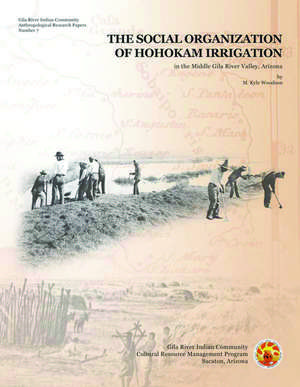The Social Organization of Hohokam Irrigation in the Middle Gila River Valley, Arizona
Autor M. Kyle Woodsonen Limba Engleză Paperback – 5 mai 2016
The seventh volume in the Gila River Indian Community Anthropological Research Papers series by M. Kyle Woodson examines the social organization of Hohokam canal irrigation management along the middle Gila River in south-central Arizona. Anthropologists have long recognized that the users of a canal irrigation system have to coordinate and cooperate with each other in the construction, maintenance, and operation of the canal system; the allocation of water; and the resolution of conflicts that arise. An irrigation organization is a social institution that manages and assigns the roles to accomplish these tasks. Yet the social organization of irrigation management cannot be fully understood without examining the link between irrigation organizations and political institutions.
Woodson's study achieves this goal by analyzing canal systems and settlement patterns at the village of Snaketown, as well as the neighboring Granite Knob, Santan, and Gila Butte canal systems and settlements during the Pioneer to Classic periods (AD 450 to 1450). With this study, Woodson returns focus to Snaketown, where Emil Haury originally defined the Hohokam cultural tradition and which has revealed yet more insights into the prehispanic world of the ancient Southwest.
Woodson's study achieves this goal by analyzing canal systems and settlement patterns at the village of Snaketown, as well as the neighboring Granite Knob, Santan, and Gila Butte canal systems and settlements during the Pioneer to Classic periods (AD 450 to 1450). With this study, Woodson returns focus to Snaketown, where Emil Haury originally defined the Hohokam cultural tradition and which has revealed yet more insights into the prehispanic world of the ancient Southwest.
Preț: 237.86 lei
Preț vechi: 292.76 lei
-19% Nou
Puncte Express: 357
Preț estimativ în valută:
45.51€ • 47.52$ • 37.67£
45.51€ • 47.52$ • 37.67£
Carte indisponibilă temporar
Doresc să fiu notificat când acest titlu va fi disponibil:
Se trimite...
Preluare comenzi: 021 569.72.76
Specificații
ISBN-13: 9780972334761
ISBN-10: 0972334769
Pagini: 288
Dimensiuni: 216 x 279 x 18 mm
Greutate: 0.77 kg
Ediția:1
Editura: Gila River Indian Community
Colecția Gila River Indian Community
ISBN-10: 0972334769
Pagini: 288
Dimensiuni: 216 x 279 x 18 mm
Greutate: 0.77 kg
Ediția:1
Editura: Gila River Indian Community
Colecția Gila River Indian Community
Notă biografică
M. Kyle Woodson is the director of the Gila River Indian Community’s Cultural Resource Management Program, located in Sacaton, Arizona. He received his PhD in anthropology at Arizona State University in 2010. His research focuses on the archaeology and history of southern Arizona, with special emphasis on Hohokam canal irrigation agriculture, community organization, and ceramic production and technology.
Descriere
The seventh volume in the Gila River Indian Community Anthropological Research Papers series by M. Kyle Woodson examines the social organization of Hohokam canal irrigation management along the middle Gila River in south-central Arizona. Anthropologists have long recognized that the users of a canal irrigation system have to coordinate and cooperate with each other in the construction, maintenance, and operation of the canal system; the allocation of water; and the resolution of conflicts that arise. An irrigation organization is a social institution that manages and assigns the roles to accomplish these tasks. Yet the social organization of irrigation management cannot be fully understood without examining the link between irrigation organizations and political institutions.
Woodson's study achieves this goal by analyzing canal systems and settlement patterns at the village of Snaketown, as well as the neighboring Granite Knob, Santan, and Gila Butte canal systems and settlements during the Pioneer to Classic periods (AD 450 to 1450). With this study, Woodson returns focus to Snaketown, where Emil Haury originally defined the Hohokam cultural tradition and which has revealed yet more insights into the prehispanic world of the ancient Southwest.
Woodson's study achieves this goal by analyzing canal systems and settlement patterns at the village of Snaketown, as well as the neighboring Granite Knob, Santan, and Gila Butte canal systems and settlements during the Pioneer to Classic periods (AD 450 to 1450). With this study, Woodson returns focus to Snaketown, where Emil Haury originally defined the Hohokam cultural tradition and which has revealed yet more insights into the prehispanic world of the ancient Southwest.
